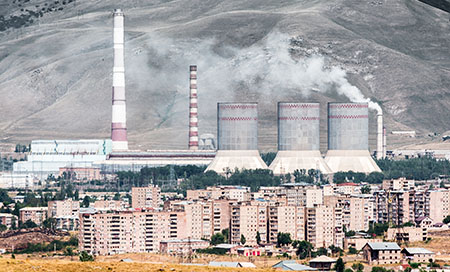
On 16 November 2021, the OECD GREEN Action Task Force organised an expert meeting on “Fossil-fuel subsidies in Armenia in the context of the SDG reporting framework” with the participation of key Armenian government offices.
Reforming and phasing out fossil-fuel subsidies (FFSs) lies at the heart of combating climate change and achieving net-zero emissions. As a result of the various negative impacts of FFSs, their reform was also turned into Target 12.c and Indicator 12.c.1 that call for the rationalisation and phase-out of inefficient, economically wasteful and environmentally-harmful FFSs under Sustainable Development Goal (SDG) 12 (“Ensure sustainable consumption and production patterns”).
United Nations Environment Programme (UNEP), as a custodian of the SDGs, has developed a template which will allow countries to report on SDG12 and the related Target 12.c and Indicator 12.c.1. Given that this is the first time countries will be asked to report on this target and indicator and given the OECD experience with compiling FFS policy measures through its Inventory database (https://www.oecd.org/fossil-fuels/data/), UNEP, in close cooperation with the OECD, has identified pilot countries to test the reporting template and provide feedback on the facility of its completion.
The OECD analysis shows that of all EU’s Eastern Partnership (EaP) countries Armenia has made the most significant progress in eliminating and phasing out subsidies that go to the energy sector. Armenia has the smallest number of subsidy schemes (6) and the lowest level of government support, which amounted to USD 5 million in 2019 compared to USD 42 million in 2014.
Given Armenia’s success with FFSs reform and UNEP interest to test the reporting template also in a non-OECD country, Armenia has been suggested as a very good candidate to participate in the test group of countries under the UNEP and OECD work. Preparing and submitting this first report can help raise Armenia’s profile in the international arena.
Objectives of the meeting
To finalise the process of FFS report completion, the OECD organised a joint meeting with key relevant government institutions of Armenia. The main objectives of the meeting were to:
- Present the main findings of the OECD work on fossil-fuel subsidies in the EaP region including in Armenia and discuss Armenia’s progress with FFS reform;
- Clarify any methodological issues related to the identification and measurement of FFSs in Armenia;
- Present and discuss Armenian experience with completing the SDG-related FFSs reporting template and agree on the final version of the report that could be submitted to the UN;
- Clarify the process of submission of the report to the UN and identify the government institution that will lead the process and further communicate with UNEP.
Participants
The meeting brought together representatives of the key government institutions in Armenia working on energy sector reform and reporting. These included, among others, the Ministry of Environment, Ministry of Finance, Statistical Committee, Ministry of Territorial Administration and Infrastructure. Experts from the OECD, United Nation Environment Programme (UNEP) and the International Institute for Sustainable Development (IISD) working on fossil-fuel subsidies participated as well.
Meeting documents
Presentation slides
Why monitoring FFSs matters and what we know about the FFSs landscape in the EaP countries (English | Armenian) (Nelly Petkova, OECD)
OECD Inventory of Fossil Fuel Support Database (English | Armenian) (Mark Mateo, OECD)
Completed SDG-related FFS reporting template (English | Armenian) (Tigran Sekoyan, National expert, Armenia)
Related publications
- Fossil-fuel subsidies in the EU’s Eastern Partner Countries: Estimates and Recent Policy Developments (2021) (Russian)
- Inventory of Energy Subsidies in the EU’s Eastern Partnership Countries (2018) (Russian)





